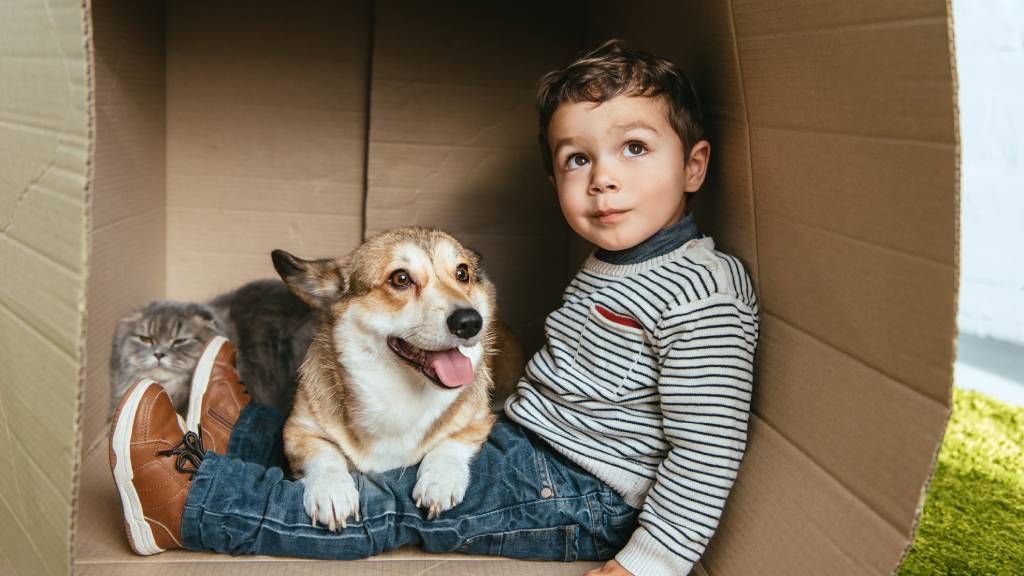Kids, cats, or canines – what’s best for your family?

Adding another teammate to your household is an exciting move for every family. It means you’ll finally be able to sleep less, spend more money, and stress over their long-term wellbeing. Welcome to parenthood! If you haven’t made a run for it yet, you probably already know the abundance of benefits that come with the territory as well. Improved psychological health, a sense of purpose, long-term companionship, and one (or two) more reasons to plan that yearly holiday you keep putting off. Fair go!
For many of us, the benefits of having kids or pets are an easy sell. But deciding the species of the newest addition to your family can be a little trickier. Here’s some things to consider before locking in either option.
The benefits of canines
Kiwis with dogs (a bizarre statement) are reaping all sorts of health benefits. Dogs can reduce stress and anxiety, push you into a daily routine, and even act as your sidekick for socialising and meeting new people.
One of the biggest upsides of getting a dog is the freedom to decide exactly what kind of companion you want. Unlike other pets, dogs come in a huge mix of sizes, types, personalities, and lifestyles. From tiny toys that sleep all day to brawny beasts that never stop running, the choices will make you feel like a kid in a candy store. If you’re undecided, you may even find a specific crossbreed that ticks all the boxes you need.
With the right upbringing, dogs can turn into productive family members that pull their own weight around the house. From tracking down old food that could attract roaches, to joining you on those morning jogs, canines can be just as useful as they are loving.
Keep in mind that most dogs are pack-oriented by nature, so you may need to expect plenty of barking, close attention, and a curious sniff-down of anyone you meet. You’ll also need to commit to a good training program to avoid unwanted behaviour like jumping, mounting, or excessive chewing.
Don’t forget to consider your living arrangement too. Even small dogs require a fair bit of space to exercise in, so granny flats, apartments, or tiny houses might not work the best unless you commit to daily workout sessions. Or, why not bring your dog along to see some of New Zealand’s best hiking trails?
Average cost: $1,686 a year.
The benefits of cats
There’s arguably nothing more warming than a young kitten, but there’s also plenty to look forward to as your cat grows older. Cats are generally pretty mellow and neat, opting for a gentle brush of your leg. Once trained, they usually don’t need a lot of cleaning or grooming, which is a big win if you’re strapped for time.
Thanks to their nimble size, cats don’t need a huge amount of space, making them great for those of us living in tight city quarters. Their noise footprint is also minimal. If you’re a light sleeper or can’t tolerate loud noises, you might feel right at home.
When it comes to costs, cats pack one of the best buddy-to-buck ratios. They offer companionship and warmth and cost a minimal amount to keep,particularly if comparing to feeding a large dog.
That being said, there’s an unavoidable drawback of bringing any pet into your family – saying the final goodbye. By most measures, owners are expected to outlive their pets, which means you’ll need to prepare for the sad day when your beloved pet moves on.
Average cost: $670 a year.
The benefits of kids
Having a child might sound like the most obvious choice of adding a new family member to the crew, but times have changed since yesteryear. According to 2018 census data, the most common number of children that women decide to have is…zero!
But at the same time, once the first child is born, most families don’t stop there – having two or three children is more common than having just one. While there are no hard rules to follow here, it might be worth remembering that having a kid could turn into a much bigger group down the line, which can lead to some chaotic Christmas shopping.
Regardless of how many munchkins you decide to have, becoming a parent is arguably one of the most defining moments of life. Not only are you contributing to a healthy supply of Kiwis for the next generation, you’re also securing a long-term member of your family and community. If your genetics are in good shape, you could even introduce the world to a new Einstein or Winston Churchill (thanks in advance).
Raising a child is no small feat though, so make sure you read up on what’s involved. You’ll need to be prepared. According to one study, the average spend was $403 a week, for two children, in a modest income home. That equates to about $10,478 per child annually.
When it comes to lifestyle, kids thrive with stability and long-term security. If you’re constantly moving around, switching careers, or changing your living situation, it might be best to wait it out until you know exactly where you’re heading.
Being a parent also throws you into a lot of fiery discussions like childcare rebates, public vs. private schooling, whether or not to use baby formula, how to deal with bullying, online privacy concerns, the cost of living, and countless other public debates. If you’d rather not get involved, you can always stay off social media.
Average cost: $8,750 – $14,000 a year.
26 Sept 2021